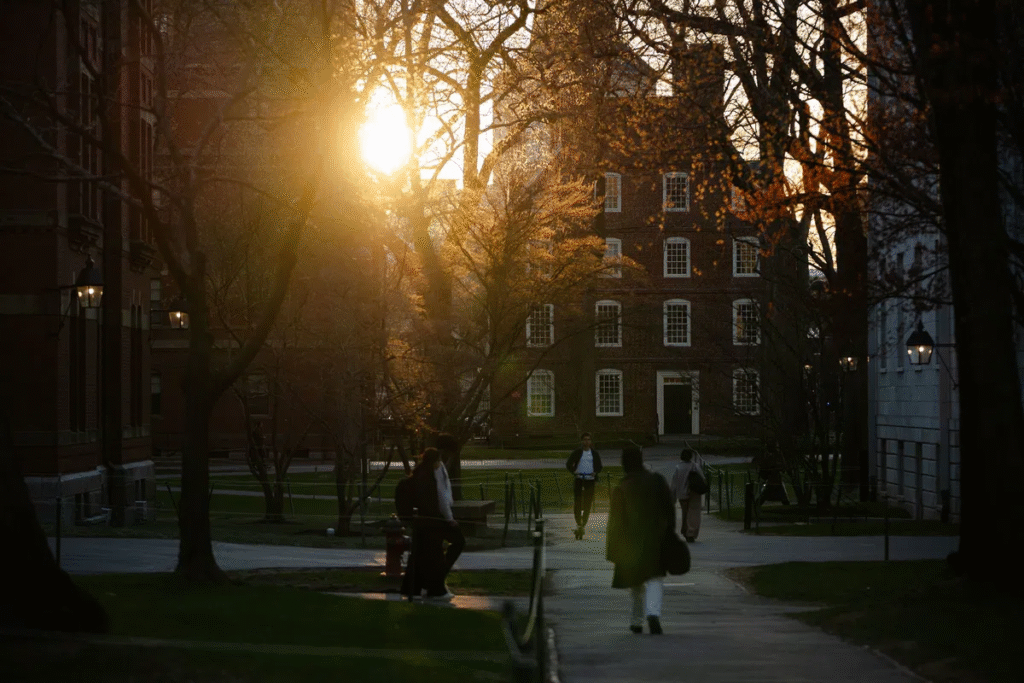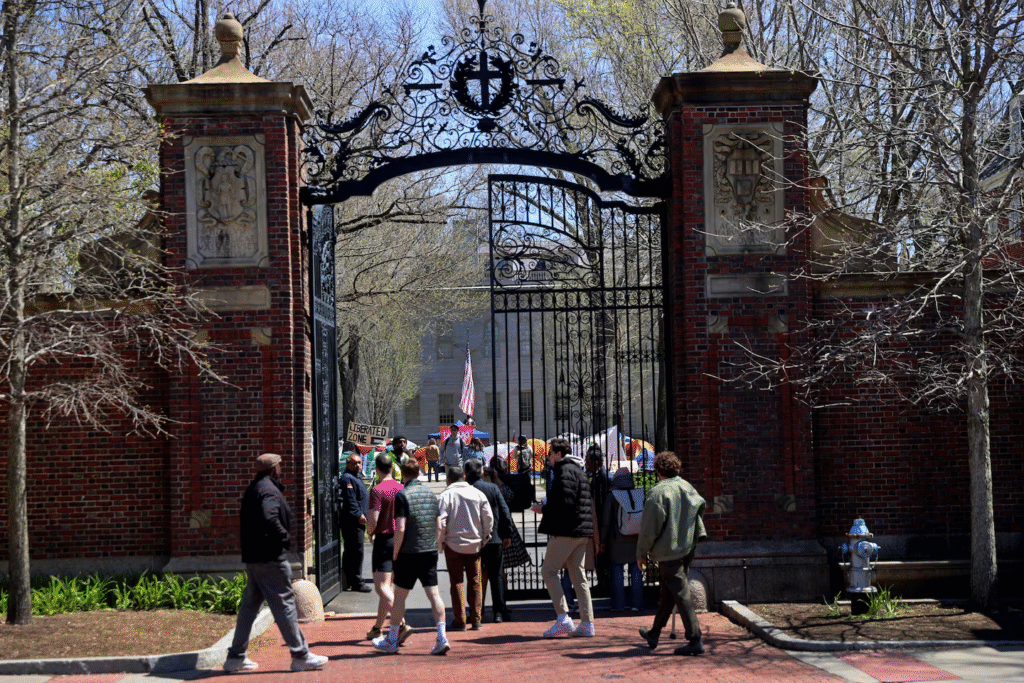Months Since returning to office in January, President Donald Trump has intensified efforts to challenge America’s elite universities over perceived political bias. However, the foundation for the administration’s tougher approach was laid more than a year earlier.
Months The turning point came two months after Hamas’ October 7, 2023, attack on Israel, which triggered the war in Gaza and ignited widespread protests on college campuses. During a congressional hearing, Harvard University’s then-president Claudine Gay was asked whether “calling for the genocide of Jews” violated the university’s rules on bullying and harassment.
Months Gay later issued an apology, but the backlash—combined with a separate plagiarism controversy—led to her resignation. Jewish organizations and critics argued that Harvard was failing to take antisemitism seriously, prompting renewed scrutiny.
Months The controversy gave fresh momentum to long-standing conservative criticism of higher education, especially claims that elite institutions harbor liberal bias.
Months The university has since implemented stricter rules banning protest encampments that disrupt student life, added doxing to its list of harassment violations, and broadened its diversity and inclusion efforts to better support Jewish students.
Months Despite steps taken, the Trump administration continues to pressure Harvard over alleged campus antisemitism. This month, the White House issued sweeping new policy demands to the university’s leadership, threatening to withhold billions in federal funding.
Months While both the Anti-Defamation League and Harvard’s Hillel chapter have welcomed the administration’s focus on antisemitism, they have also criticized the threat of funding cuts as excessive and potentially harmful to Jewish students.
Months Here is a timeline of key developments in the dispute:
Months January 29: Just days into his second term, President Trump signs an executive order mandating stricter enforcement of federal efforts against antisemitism. The order cites increased harassment of Jewish students since Hamas’ October 7, 2023, attack on Israel, including reports of discrimination, restricted access to campus facilities, intimidation, and threats.
Months Although no schools are specifically named, the order directs top officials to recommend ways universities should “monitor for and report activities by alien students and staff.” It also suggests using federal laws to remove foreign nationals who are found to “endorse or espouse terrorist activity.”
Months The order becomes a central tool in the administration’s push for changes at Harvard and is later used to justify efforts to deport or revoke visas of foreign scholars allegedly involved in pro-Palestinian protests—even without concrete evidence.

Months February 3: The Department of Justice forms a multiagency Task Force to Combat Anti-Semitism, led by attorney and former radio host Leo Terrell.
February 27: The Justice Department’s Civil Rights Division sends a formal letter to Harvard President Alan Garber. The letter demands a meeting within 30 days with key university figures and Jewish campus groups. Signed by Terrell, it states the department is aware of claims that Harvard may have failed to protect Jewish students and faculty from discrimination, potentially violating civil rights laws.
February 28: The antisemitism task force announces plans to visit 10 college campuses, including Harvard, to meet with school officials, students, local law enforcement, and community members.
March 10: Harvard is among 60 universities notified by the Department of Education’s Office for Civil Rights that they are under investigation for possible violations of the Civil Rights Act, specifically concerning allegations of antisemitic harassment and discrimination.
“U.S. colleges and universities benefit from substantial public investment funded by American taxpayers,” Education Secretary Linda McMahon said in a statement.
March 31: The General Services Administration (GSA) notifies Harvard that it is launching a formal review of all federal contracts and grants awarded to the university. According to a memo and email from GSA Commissioner Josh Gruenbaum, more than $8.7 billion in multi-year grant commitments are under scrutiny.
According to a report by The New York Times, he remarked during a closed-door conversation at the White House, “Wouldn’t that be cool?”—a comment later confirmed by a source familiar with the discussion.
April 3: Gruenbaum sends an official email to Harvard President Alan Garber, warning that the university must meet specific pre-conditions to remain eligible for federal funding. Attached to the email is a two-page letter co-signed by attorneys from the Departments of Health and Human Services and Education.
The administration demands not only enhanced measures to address antisemitism and penalize discriminatory behavior but also broader changes. These include eliminating race, color, or national origin as factors in admissions and hiring, scaling back diversity, equity, and inclusion (DEI) programs, and improving ideological diversity on campus.
April 11: A follow-up letter from the administration intensifies the pressure. Using firmer language, attorneys from the same federal agencies assert that Harvard has “failed in recent years to uphold the intellectual and civil rights standards that warrant federal support.”
Following the April 11 letter, the Trump administration presented Harvard with a proposed four-page “agreement in principle” outlining a series of sweeping demands. Among them: the university must overhaul its international student program to prevent the admission of students perceived as hostile to “American values and institutions” as outlined in the U.S. Constitution and Declaration of Independence. The agreement specifically targets students who support terrorism or antisemitism, and calls for Harvard to report any foreign students who violate campus conduct policies to federal authorities.
If the institution is found lacking in ideological diversity, it would be obligated to hire a “critical mass of new faculty” to address the issue. Additionally, the earlier directive to make “efforts” to wind down Diversity, Equity, and Inclusion (DEI) programs is now framed as a mandatory action, with an August deadline for compliance.
April 14: Harvard publicly releases the April 11 letter, along with a firm response from President Alan Garber, who outright rejects the administration’s demands. He asserts that complying with the proposed agreement would violate the university’s constitutional rights.
Later that same day, the Task Force to Combat Anti-Semitism announced a “freeze on $2.2 billion in multi-year grants and $60 million in multi-year contract value” to Harvard in response to the university’s refusal to comply. “Within hours of the Freeze Order, Harvard began receiving stop work orders,” the university stated in its lawsuit.
April 15: Former President Donald Trump posts on Truth Social suggesting that Harvard should potentially lose its tax-exempt status. Education Secretary Linda McMahon later tells CNN the proposal “was certainly worth looking into.”

April 16: The Department of Homeland Security issues a warning that it may revoke Harvard’s certification for the Student and Exchange Visitor Program, putting the status of thousands of international students at risk.
April 17: The Department of Education revives a previously closed investigation, requesting records from Harvard on all foreign gifts and information about “expelled foreign students.” The letter notes that “critical aspects of Harvard’s recent foreign funding disclosure submissions are a cause for concern.” The Biden administration had previously closed the inquiry, but Harvard now agrees to update its financial disclosures.
April 21: Harvard files a lawsuit against the Trump administration, alleging that the threats to withhold federal funding violate the First Amendment and are “arbitrary and capricious.” The university claims it was not properly notified by the Department of Health and Human Services (HHS) about any additional conditions tied to its federal grants and argues that legal procedures for altering grant terms were not followed.
April 22: Despite the legal action, the Trump administration maintains that negotiations are ongoing. Education Secretary McMahon reiterates that the demands laid out in earlier correspondence were part of a continuing dialogue.
April 23: In a new legal filing, Harvard requests expedited consideration of its lawsuit, arguing that the funding freeze jeopardizes vital research and academic programs and suppresses the university’s right to free expression.
A memo from EEOC Commissioner Andrea Lucas cites the university’s diversity hiring practices and scholarship programs for “underrepresented minorities” as possible violations of the civil rights of White, Asian, male, and heterosexual applicants.
April 28: Harvard and the federal government appear in court for the first hearing in the university’s lawsuit challenging the funding freeze. U.S. District Judge Allison Burroughs, an Obama appointee, schedules oral arguments for July 21. Since Harvard has not requested an emergency injunction, the freeze on federal funding is expected to remain in place until a final ruling is issued—unless the Trump administration opts to reverse the freeze beforehand.
According to the Harvard Crimson, Charleston also informs several student affinity groups that the university will no longer support race-based commencement ceremonies, following a warning from the Department of Education regarding events segregated by race.
Separately, the Trump administration announces a new investigation into the Harvard Law Review after receiving complaints alleging race-based discrimination.
One report examines how the university has addressed antisemitism and anti-Israel sentiment; the other focuses on bias against Muslims, Arabs, and Palestinians.
April 30: A White House official reacts to the task force findings, calling the recommendations “positive,” but adds that they are insufficient. “There’s actually probably going to be additional funding being cut,” the official tells CNN.
This follows a demand by DHS Secretary Kristi Noem for details on visa holders involved in “illegal” or “dangerous or violent” activities. Weenick does not specify whether Harvard complied fully with all aspects of the request but notes that “our participation in SEVP is unchanged at this time, and any withdrawal by DHS of Harvard’s certification would be involuntary.”
May 5: The Trump administration formally halts the issuance of new federal research grants to Harvard. In a letter sent to President Garber, Education Secretary Linda McMahon states that Harvard is no longer eligible to receive federal research funding due to its “consistent violations of its own legal duties.”
The Trump administration’s latest letter to Harvard outlines continued concerns over the university’s policies, including its stance on affirmative action, campus protests, and the prior suspension of standardized testing requirements such as the SAT and ACT—though those tests were reinstated in April 2024. The letter also criticizes the university’s overall governance.

Education Secretary Linda McMahon further highlights external criticism, noting that hedge fund CEO Bill Ackman has called for the resignation of Penny Pritzker, the head of the Harvard Corporation, which governs the university.
May 6: Harvard reaffirms its support for Pritzker. In a statement to The Wall Street Journal, President Alan Garber and the Harvard Corporation praise her leadership: “We applaud her dedicated stewardship and her leadership.”
May 12: Garber issues a formal response to McMahon’s letter, acknowledging shared goals between Harvard and the Trump administration, such as combating antisemitism and promoting a diversity of viewpoints. However, he argues that federal overreach has impeded progress:
May 13: The Task Force to Combat Anti-Semitism announces an additional freeze on approximately $450 million in federal funding earmarked for Harvard. A joint statement from attorneys at the Departments of Education and Health and Human Services accuses the university of prioritizing appeasement over accountability:
The task force states the funding halt involves contributions from eight federal agencies but does not release further specifics.
May 15: The Department of Energy notifies Harvard that it is revoking approximately $89 million in grants from its Office of Science and Advanced Research Projects Agency–Energy. The decision is attributed to what the agency describes as the university’s “policy of racial discrimination.” The department’s letter also cites Harvard’s “ongoing inaction in the face of repeated and severe harassment and targeting of Jewish students.”
May 19: The Department of Justice announces a new initiative to use the False Claims Act to investigate diversity programs at U.S. colleges. In a memo, Deputy Attorney General Todd Blanche identifies potential violations—including failure to prevent antisemitism and allowing transgender women to participate in women’s sports—as grounds for the loss of federal funding. Blanche also encourages private individuals to file civil lawsuits against institutions suspected of violating civil rights laws in order to recover taxpayer money.
